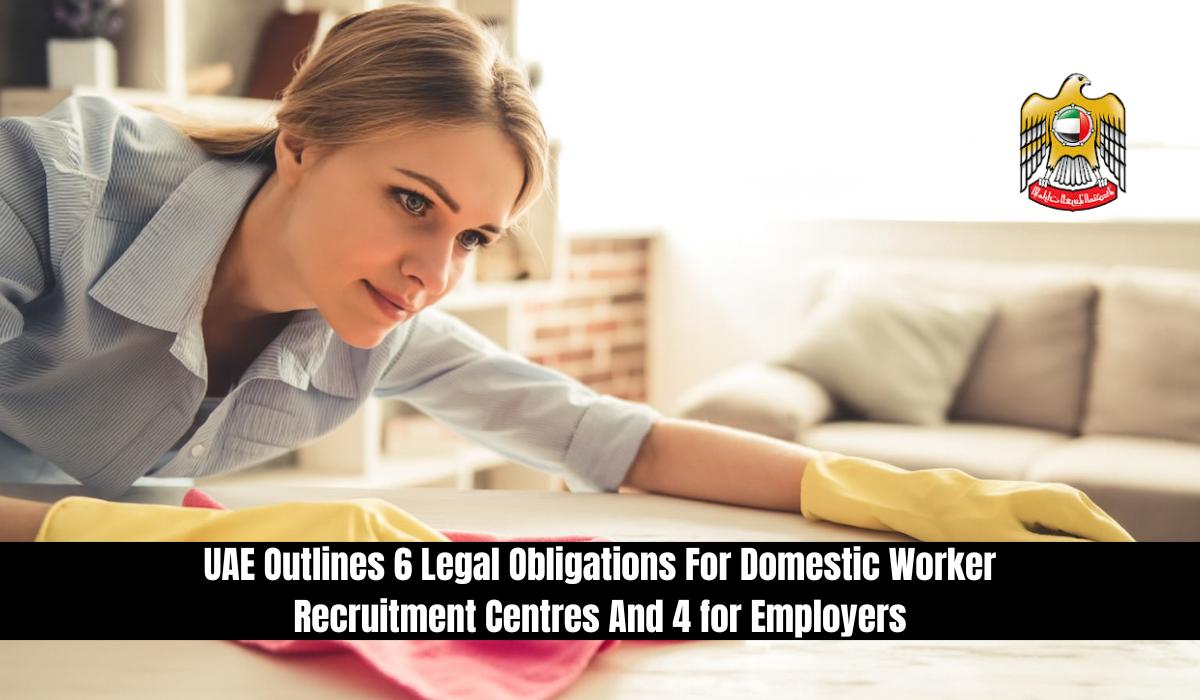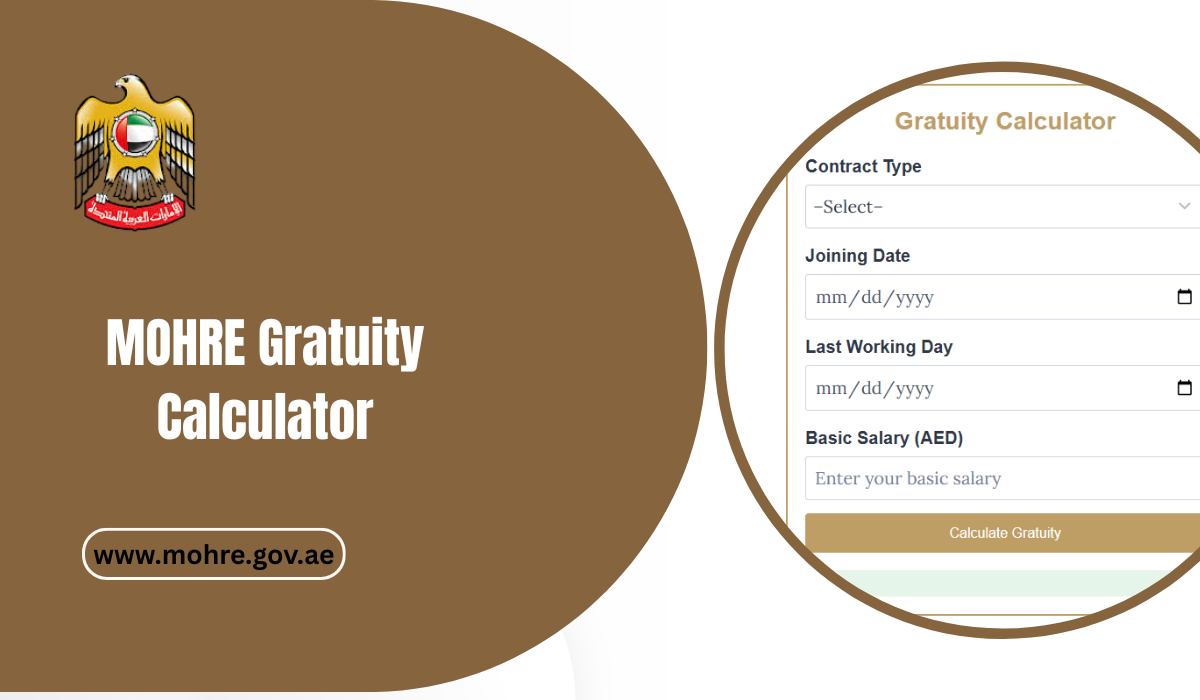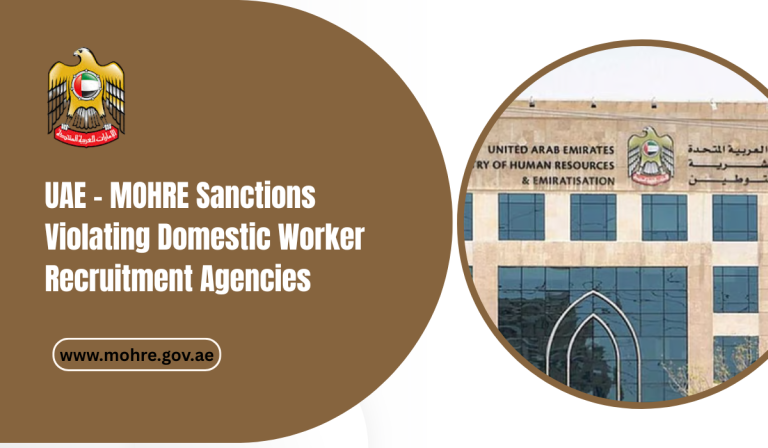UAE Outlines 6 Legal Obligations For Domestic Worker Recruitment Centres And 4 for Employers

UAE Outlines 6 Legal Obligations For Domestic Worker Recruitment Centres And 4 for Employers. The United Arab Emirates (UAE) has taken significant steps to align its domestic worker regulations with international labour standards, specifically those outlined by the International Labour Organization (ILO). Through recent updates from the Ministry of Human Resources and Emiratisation (MoHRE), clear legal obligations have been defined for both domestic worker recruitment centres and employers.
In this article, we explore the 6 legal obligations for recruitment centres, the 4 employer responsibilities, entitlements of domestic workers, refund and repatriation rules, and the broader legal framework protecting domestic workers in the UAE.
MoHRE Aligns Domestic Worker Law With Global Labour Standards
To promote transparency, fair treatment, and ethical hiring practices, MoHRE has launched initiatives to harmonise UAE domestic worker laws with ILO Convention No. 189 and Recommendation No. 201. These measures focus on safeguarding worker rights, ensuring informed consent, and regulating agency conduct.
6 Legal Obligations for Domestic Worker Recruitment Centres
Recruitment agencies play a critical role in the ethical hiring and deployment of domestic workers. MoHRE mandates that all domestic worker recruitment centres must adhere to six core legal duties:
| Legal Obligation | Description |
|---|---|
| MoHRE-approved Contracts | Agencies must use standardised employment contracts provided by MoHRE to ensure fairness and clarity. |
| Cultural Orientation | Workers must be educated about UAE customs, traditions, and legal expectations. |
| Complaint Mechanisms | Workers should be informed about how to file complaints legally and safely. |
| Repatriation Responsibility | Agencies must cover the cost of repatriation if the worker cannot continue employment. |
| Medical Screening | All domestic workers must undergo comprehensive medical checks within 30 days of entering the UAE. |
| Accommodation Provision | Agencies are responsible for providing temporary accommodation prior to the worker’s deployment or upon return. |
Refund Policy for Domestic Worker Recruitment
In cases where the placement fails, recruitment centres are legally bound to refund full or partial recruitment fees depending on the nature of the termination.
Conditions Requiring Refunds:
- The worker is medically unfit during the probationary period.
- The worker is professionally or behaviourally unfit.
- The worker leaves without a legitimate reason.
- The employer terminates the contract due to unmet terms.
Refund Calculation Formula:
If the termination occurs after the first month of employment, the partial refund is calculated as follows:
(Total Recruitment Cost ÷ Contract Duration in Months) × Remaining Months
For instance, if the recruitment fee is AED 15,000 for a 24-month contract and the worker leaves after 4 months, the calculation would be:
(15,000 ÷ 24) × 20 = AED 12,500 refund
If the contract is terminated within the first month, a full refund (including government fees) is required.
4 Key Responsibilities of Employers in the UAE
The Ministry of Human Resources and Emiratisation has also outlined clear legal expectations for employers hiring domestic workers. These obligations help maintain the dignity and well-being of domestic staff.
| Employer Responsibility | Explanation |
|---|---|
| Pay All Fees | Employers must settle all associated fees, including government charges and recruitment centre costs. |
| Salary Payment | Employers are required to pay the agreed salary on time and in accordance with MoHRE regulations. |
| Medical Care | All domestic workers must be provided with adequate medical care, including coverage for treatments. |
| Accommodation & Tools | Employers must provide suitable housing and necessary tools for work tasks. |
Annual Leave Entitlements for Domestic Workers
Under UAE law, domestic workers are entitled to paid annual leave as follows:
| Service Duration | Annual Leave Entitlement |
|---|---|
| Less than 6 months | Not eligible |
| 6 to 12 months | 2 days per month |
| More than 12 months | 30 days of paid leave |
In cases where the worker leaves before using their leave, they are entitled to cash compensation for unused leave.
Additionally, workers are entitled to a round-trip air ticket every two years to their home country.
UAE Domestic Worker Recruitment Packages
To support different household needs, MoHRE offers three types of domestic worker hiring packages:
| Package Type | Sponsorship | Contract Terms |
|---|---|---|
| Traditional | Employer sponsors the worker | Two-year contract |
| Temporary | Centre sponsors the worker | Two-year renewable contract |
| Flexible | Centre sponsors the worker | Hourly, daily, or monthly work |
These options allow employers to select arrangements based on flexibility, cost, and long-term commitment.
Domestic Workers Law: Fairness and Consent
The UAE’s Federal Law on Domestic Workers ensures ethical employment by enforcing:
- Informed consent before hiring: Workers must understand the job description, salary, working hours, location, and rest periods.
- Anti-discrimination policies: Employment cannot be influenced by race, religion, nationality, gender, or social background.
- Coverage for 19 job roles, including cleaners, nannies, gardeners, drivers, cooks, and more.
This law is fully aligned with ILO international labour protections.
Federal Decree-Law on Domestic Workers (2023)
The UAE has passed Federal Decree-Law No. 21 of 2023, amending previous provisions under Decree-Law No. 9 of 2022. This law governs the rights, protections, and duties of domestic workers and their employers.
Prohibited Practices Under the Decree:
- Employment of individuals under 18 years old
- Discrimination of any kind
- Sexual harassment (verbal or physical)
- Forced labour or human trafficking
- Assigning unauthorised tasks outside the contract scope
- Hiring workers without MoHRE approval
Digital Services for Domestic Worker Hiring
To streamline the hiring process and uphold legal standards, the UAE government provides several digital tools for employers and agencies.
| Service | Platform |
|---|---|
| Licensing & monitoring of recruitment agencies | MoHRE website |
| Complaint submission and inquiries | MoHRE eServices and Abu Dhabi TAMM portal |
These platforms enhance transparency and help both employers and workers track complaints, monitor agency conduct, and access legal resources.
Importance of Compliance for Recruitment Centres and Employers
Domestic worker recruitment centres in the UAE must operate within a framework of accountability, transparency, and legal compliance. Similarly, employers who fail to meet their obligations can face legal penalties, including fines, bans on future recruitment, or criminal charges in extreme cases (e.g. abuse or trafficking).
FAQs About UAE Outlines 6 Legal Obligations For Domestic Worker
What happens if a domestic worker leaves during probation?
Ans: If a domestic worker voluntarily leaves during the six-month probation, the recruitment centre is obligated to refund the employer. If the departure is due to misconduct or unfitness, the refund must be full or prorated based on contract duration.
Can an employer switch from a flexible package to a traditional one?
Ans: Yes. Employers can choose to upgrade from a flexible package to a traditional one by completing the necessary transfer of sponsorship and signing a new two-year contract approved by MoHRE.
What should workers do if their rights are violated?
Ans: Workers can lodge complaints through the MoHRE website, the TAMM portal, or by visiting MoHRE customer service centres. They can also contact the labour dispute resolution committee for mediation.
Conclusion
The UAE domestic worker law reflects the country’s commitment to ethical labour practices, worker protection, and employer transparency. By following the 6 legal obligations for domestic worker recruitment centres and the 4 key employer responsibilities, all parties can enjoy a fair, safe, and sustainable working relationship.











